Jonglei: 160 airlifted to Bor for treatment as UN gains access to Pibor clashes
July 14, 2013 (BOR/JUBA) – At least 160 wounded people were flown to Bor civil hospital in Jonglei on Sunday from Manybol in Pibor county, after United Nations troops accessed the Nanaam area for the first time since fighting between rival groups broke out last week.
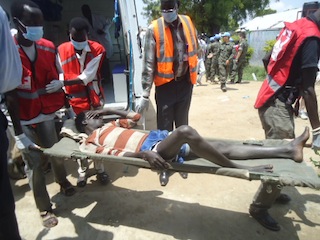
The fighting has been focused around Nanaam village in Pibor, but due to the remoteness of the area, the government and UN have not been able to provide details about the clash.
South Sudan’s army says that the area has been occupied by rebels loyal to David Yauyau, who has led on and off rebellion in Pibor since 2010.
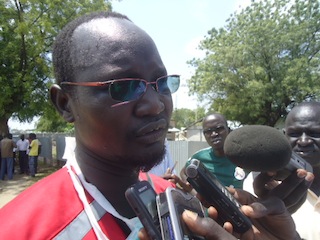
Medicine Sans Frontiers (MSF), the UN’s World Health Organisation (WHO) and International Committee of the Red Cross (ICRC) sent in a team of doctors to Bor hospital to help treat the wounded.
The United Nations Mission in South Sudan (UNMISS) released a statement on Sunday putting the total number of people injured at more than 200 after Nepali peacekeeping troops managed to enter Manybol.
UN and WHO sources, however, say they witnessed Lou Nuer youth guarding cattle around Manybol, not far from the SPLA camp.
There are no clear details about how many people have died in the fighting, but one of the injured Lou-Nuer victims Sudan Tribune interviewed at the hospital admitted they attacked Murle areas of Pibor in response to the killing of children, women and elderly in cattle raids in the Walgak area in February 2013.
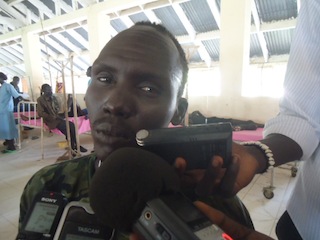
Chuol Ruac further said his community was attacked again on 4 July by Murle cattle herders, who allgedly stole some heads of cattle, killing some people in the process.
The attacks on Pibor over the last week were in retaliation to what happened, he stressed.
“This year, while we were taking our cattle, children, women and elderly to Ulang county to access water there, in Upper Nile, on our way we meet them [Murle], they killed the children and women and even the elderly ones. That was why we went this time”, Ruac told reporters at Bor hospital.
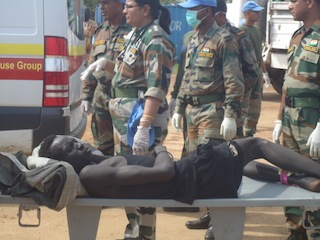
The leader of the group which attacked Pibor was, Bordua Leer, he said, adding that contrary to previous reports from the Luo Nuer community in Bor, self-proclaimed prophet Dak Kueth had not been involved in the attack.
In Tangnyang, where the Lou Nuer began their attack, Ruac said that they captured a large number machine guns and other weapons after heavy fighting with forces loyal to rebel leader David Yauyau.
SOUTH SUDAN TRYING TO CONTAIN FIGHTING
South Sudan’s defence minister, John Kong Nyuon, assured the population that government was exerting efforts to ensure the two sides are separated through cooperation and involvement of key leaders from the Luo Nuer and Murle communities.
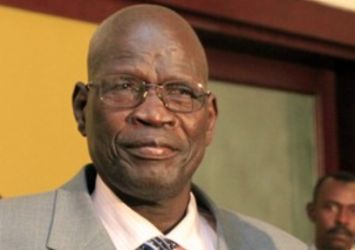
“We will do the needful as [a] government to protect civilians and their properties. We call on them (civilian population) to move to the areas where SPLA will provide protection. We are also talking to the leaders from the two sides to talk to their youth to stop taking unilateral decision and listen to the government”, Nyuon said in a statement state-owned SSTV Saturday.
His deputy, Majak D’ Agoot also said the government was talking to leaders and elders from the two communities to reach out to their youth and separate them.
“There are no details of the clashes at the moment but a lot of efforts are being exerted to contain the situation. We are talking to leaders and people who have a say in Jonglei affairs to intervene immediately. We are looking at how we can come out of this security challenges in Jonglei”, D’ Agoot said.
Murle community elder, Ismail Konyi, said the meeting with the minister of defence and his team was to explore ways to control the current situation and chat a way forward in resolving differences between the two sides.
Konyi was unable to give details of the clashes, but said the government needed to do more to stop the violence.
“It is the high time all efforts and acts are put together to avert this situation from deteriorating further. The government and the partners need to come together to chart way forward to resolve this conflict,” he urged.
UN GAIN ACCESS TO PIBOR
The UN mission said Sunday it had gained access to areas of Pibor county where civilians had previously been unable to access humanitarian assistance.
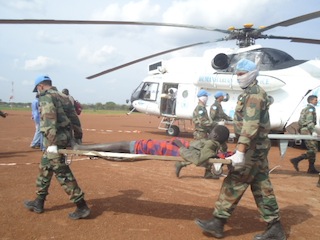
Non-governmental organisations and UN agencies have met communities near Dorain, Fertait & Labrab to assess their needs and mount a humanitarian response, including urgently needed medical attention, in addition to ongoing programmes in other parts of the state, it adds.
Toby Lanzer, the UN Humanitarian Coordinator in South Sudan, said an armed mobilisation of youth has led to clashes elsewhere in Pibor county.
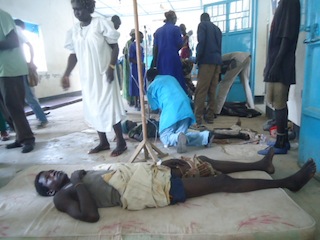
He however urged government, national, local and traditional leaders of all communities in Jonglei urgently to halt the cycle of violence that is leading to senseless loss of life and suffering amongst civilians.
“At the same time, all parties partaking in violence must ensure that aid organizations continue to have impartial, unconditional and unhindered access to civilians in need throughout the state,” said the UN humanitarian chief.
(ST)
- ST – Juba denies failing to address security challenges
- ST – Jonglei governor calls for peaceful co-existence and human rights respect

